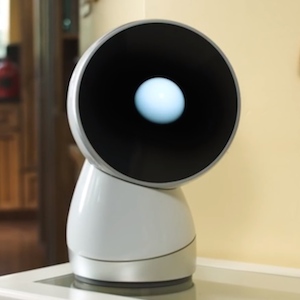JIBO, A Family Robot, Debuts At $500
JIBO, the world’s “first social robot,” made its debut this week and is now available for pre-order from MIT Media Lab.
JIBO: A Family Robot
JIBO was unveiled to the public on July 15, when Dr. Cynthia Breazeal and her team at MIT Media Lab launched the JIBO crowdfunding page on IndieGoGo. Barely 24 hours after the page’s launch, JIBO has already raised 472% of its $100,000 goal – having received $472, 467 from 1,011 funders. Funders will receive perks ranging from acceptance into the JIBO fan club and a t-shirt for $27 to a JIBO Home Edition for $499. Of course, JIBO is not expected to ship until December 2015, when the consumer version of JIBO will be released.
To use JIBO, one needs a WiFi connection, and the robot will come with a charging pad and be ‘battery-ready’ (batteries will be sold separately.) For now, JIBO, who is gendered male, can only understand and speak English, and will only respond to the name ‘JIBO,’ but the IndieGoGo page promises to work on expanding JIBO’s linguistic capacity.
At 11 inches tall and weighing in at approximately six lbs, JIBO boasts a host of inter-personal skills. Equipped with microphones, language processing and two cameras used to recognize faces and pick up on social cues, JIBO can fully interact with its user.
In the product video, JIBO is seen functioning as a ‘family robot,’ helping the mother as she cooks, taking photos of the whole family on command and helping a little girl interact with storytelling. Though JIBO can move in place and swivel and turn its flat LCD screen, it cannot physically move its position in the home, meaning it cannot roll or change its placement on its own.
JIBO Recognizes Faces, Emotions, Speech
Developers describe JIBO as an “intelligent and hands-free” assistant, an “emotional connector,” and “fun and supportive.” Founder and CEO Breazeal has been working in the field of social robotics for quite some time, and she believes that these robots are important as a social tool that can be especially useful in treating chronic loneliness in the elderly and the ill.
“It’s about human empowerment. It’s not about replacing people, it’s about augmenting and extending human networks; making people more productive, helping to facilitate people to feel more emotionally connected. It’s playing a supportive role. It’s not trying to replace people. It’s not trying to compete with human relationships,” Breazeal assured Katie Couric in a recent interview.
Breazeal stressed that social robots are not meant to replace human interactions, nor are they meant to evolve into free-thinking entities as seen in science fiction films.
“We’re not trying to create artificial human beings with this technology, we’re trying to create machines that can [jive] with human beings, but they are fundamentally robots,” Breazeal said.
“We need technology to transcend the world of information into a more humanized realm,” Breazeal told Wired, adding that JIBO is a bit of a middle ground between smart phones, tablet devices, and robots form science fiction.
GET THE FREE uINTERVIEW iPHONE APP FOR LATEST NEWS UPDATES
More like this:
> President Obama Plays Soccer With Robot ASIMO
> Meet 'Atlas' The Military Robot
RELATED ARTICLES
Get the most-revealing celebrity conversations with the uInterview podcast!









Leave a comment